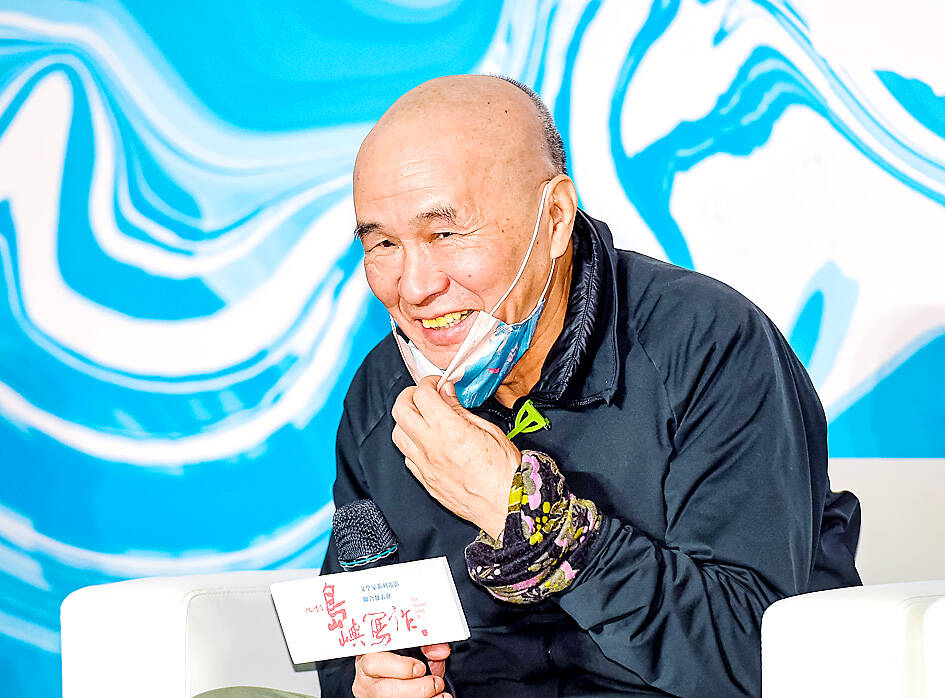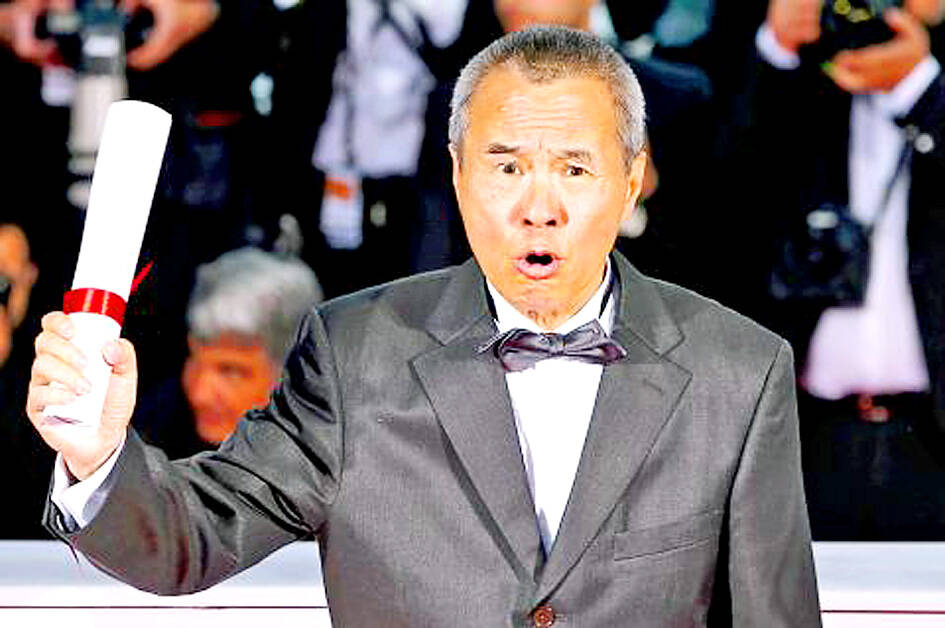Film director Hou Hsiao-hsien (侯孝賢) is to retire from cinema due to Alzheimer’s disease, his family said in a brief statement yesterday.
The announcement came on the heels of an IndieWire report that said Hou had retired due to dementia, citing among its sources a remark by an associate and film expert Tony Rayns in an introduction during the screening of Hou’s 1985 film A Time to Live and a Time to Die (童年往事).
Hou’s office in Taipei has closed its doors and its employees dismissed, the film industry and review Web site said.

Photo: Wang Wen-lin, Taipei Times
Hou’s son yesterday said in a statement that his father had been diagnosed with Alzheimer’s disease and that he had been making the long-awaited Shulan River (舒蘭河上) despite his condition until a COVID-19 infection forced an end to the project.
The family expressed hope that Hou’s friends and fans would not be saddened by his retirement, and that Hou “found his love for movies to have become more purified” before catching COVID-19.
“Hou has returned fully to family life following his recovery [from COVID-19] and he is in good mental and physical condition,” his son said, urging the public to give Hou space to enjoy his life with loved ones.

Photo: Reuters
Although Hou would not complete Shulan River, his works have already garnered acclaim from critics around the world, including many film classics that “assuredly will withstand the tides of time and be remembered,” his son said.
“Hou’s passion and approach to filmmaking will continue to live in his comrades and fans,” he said. “We give our most sincere thanks.”
Hou’s company is to continue operations, his son said.

Photo courtesy of Activator Co. Ltd.
Hou rose to international fame after his 1989 film City of Sadness (悲情城市) won the Golden Lion award at the Venice Film Festival.
The director’s later works, including The Puppetmaster (戲夢人生), Flowers of Shanghai (海上花) and Three Times (最好的時光) won plaudits at global movie festivals and independent film events.
Hou released his last film, The Assassin (刺客聶隱娘), in 2015, for which he received the Best Director award at that year’s Cannes Film Festival.

A magnitude 7.0 earthquake struck off Yilan at 11:05pm yesterday, the Central Weather Administration (CWA) said. The epicenter was located at sea, about 32.3km east of Yilan County Hall, at a depth of 72.8km, CWA data showed There were no immediate reports of damage. The intensity of the quake, which gauges the actual effect of a seismic event, measured 4 in Yilan County area on Taiwan’s seven-tier intensity scale, the data showed. It measured 4 in other parts of eastern, northern and central Taiwan as well as Tainan, and 3 in Kaohsiung and Pingtung County, and 2 in Lienchiang and Penghu counties and 1

FOREIGN INTERFERENCE: Beijing would likely intensify public opinion warfare in next year’s local elections to prevent Lai from getting re-elected, the ‘Yomiuri Shimbun’ said Internal documents from a Chinese artificial intelligence (AI) company indicated that China has been using the technology to intervene in foreign elections, including propaganda targeting Taiwan’s local elections next year and presidential elections in 2028, a Japanese newspaper reported yesterday. The Institute of National Security of Vanderbilt University obtained nearly 400 pages of documents from GoLaxy, a company with ties to the Chinese government, and found evidence that it had apparently deployed sophisticated, AI-driven propaganda campaigns in Hong Kong and Taiwan to shape public opinion, the Yomiuri Shimbun reported. GoLaxy provides insights, situation analysis and public opinion-shaping technology by conducting network surveillance

Taiwan is gearing up to celebrate the New Year at events across the country, headlined by the annual countdown and Taipei 101 fireworks display at midnight. Many of the events are to be livesteamed online. See below for lineups and links: Taipei Taipei’s New Year’s Party 2026 is to begin at 7pm and run until 1am, with the theme “Sailing to the Future.” South Korean girl group KARA is headlining the concert at Taipei City Hall Plaza, with additional performances by Amber An (安心亞), Nick Chou (周湯豪), hip-hop trio Nine One One (玖壹壹), Bii (畢書盡), girl group Genblue (幻藍小熊) and more. The festivities are to

AFTERMATH: The Taipei City Government said it received 39 minor incident reports including gas leaks, water leaks and outages, and a damaged traffic signal A magnitude 7.0 earthquake struck off Taiwan’s northeastern coast late on Saturday, producing only two major aftershocks as of yesterday noon, the Central Weather Administration (CWA) said. The limited aftershocks contrast with last year’s major earthquake in Hualien County, as Saturday’s earthquake occurred at a greater depth in a subduction zone. Saturday’s earthquake struck at 11:05pm, with its hypocenter about 32.3km east of Yilan County Hall, at a depth of 72.8km. Shaking was felt in 17 administrative regions north of Tainan and in eastern Taiwan, reaching intensity level 4 on Taiwan’s seven-tier seismic scale, the CWA said. In Hualien, the